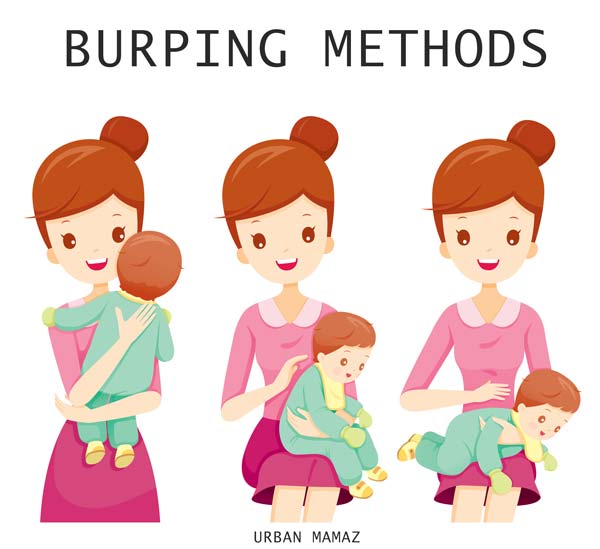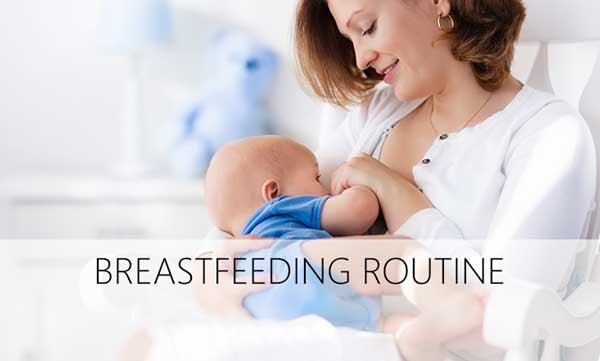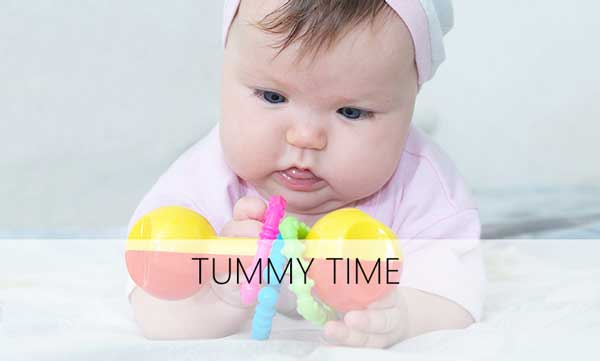Things Moms Shouldn’t Do With The Newborn
Every mother will tell you that motherhood is not easy. It becomes even more difficult when a mom commits mistakes that have negative consequences in the baby’s life.
Here are 15 mommy mistakes that you should never do with your newborn:
1. Not supporting the baby’s head when holding him or her
Failing to secure your baby’s head can cause damage to their neck or result in injuries. A newborn baby has weak head and neck muscles and very little strength to move their head. If the head isn’t supported it will flop backward or forward and startle the baby, making them feel very insecure. They could even choke especially when you are breastfeeding them.

You can stop supporting your baby’s head once he gains sufficient neck strength, which is usually around 3 or 4 months. You can ask your pediatrician if you’re unsure. By this point, he’s on his way to reaching other important developmental milestones. Sitting up by himself, rolling over, cruising, and scrawling.
Related:
2. Pulling the baby by the hands

Since your baby is still developing, pulling them by the hands can cause them discomfort in the shoulder sockets and even cause injury. Never pick up an infant or toddler by the hands or wrists, but lift under the armpits.
3. Walk Away During Bath Time
Never leave a newborn alone in the bathtub. It is never, ever safe to leave your baby unattended in the bath, and in fact, it isn’t recommended that you leave your child alone in the bath until they are around 6 years old. You should never leave the bathroom with water still in the bathtub – always empty it before you leave.
4. Not burping after feeding
You have to burp your newborn once you are done with feeding to help them get rid of the air they have swallowed during feeding, especially before sleeping. Not being burped often and swallowing too much air can make a baby spit up, or seem cranky or gassy. Baby gas is when your baby’s stomach is inflated with air due to digestion that is still developing or when the baby has swallowed a lot of air while feeding. Gas can cause a baby to bloat, experience pain, and be irritant. Read more about how to burp newborns and how to treat and prevent infant gas and colic.

5. Skip Your Baby’s Check-Ups
Routine baby checkups and childhood vaccines prevent illness, lasting health problems, and even death. These checkups, also known as well-child checks, are an opportunity to track your child’s development, make sure they’re getting the care they need to stay healthy, and for parents to get answers to any parenting questions. You should avoid missing check-ups.
When should a baby have checkups?
Some pediatricians’ schedules will vary slightly, but the American Academy of Pediatrics (AAP) recommends babies get checkups at birth, 3 to 5 days after birth, and then at 1, 2, 4, 6, 9, 12, 15, 18, and 24 months.
6. Exclusively breastfeeding when there is not enough milk supply
The American Academy of Pediatrics recommends exclusive breastfeeding for about 6 months, and then continuing breastfeeding while introducing complementary foods until your child is 12 months old or older. But unfortunately, not all women are able to breastfeed comfortably mainly due to low milk supply, which is a common problem experienced by a number of nursing mothers.
Poor nutrition, sore nipples, baby’s inability to suck properly, or stress can cause an inadequate supply of milk. While some of the causes may be prevented, some moms can take a while to establish a good milk supply. Here are the most common symptoms of not eating enough while breastfeeding.
If this happens to be you, then you may need to add more formula supplement to your baby. But before doing so, you should take your baby to a pediatrician to track your baby’s development and check if your baby is gaining enough weight. If your baby is not gaining enough weight and the reason is low milk supply, then you’ll need to ask a lactation consultant for help with increasing your milk supply or establish a good feeding schedule that will combine breastfeeding and formula feeding.
You should know that there are natural ways to increase milk supply that may help, here is an article on how to increase breast milk naturally. And here is a fudgy lactation brownie boobie bites recipe that can help boost your milk supply.
7. Feeding regular formula on a sensitive stomach
Not all babies are the same. Some babies’ may be sensitive to ingredients in the formula or even have milk allergies. If a baby’s tummy is sensitive to regular formula, they may be extra fussy throughout the day or even throw up after fed regular formula.
Common symptoms of milk allergies in babies include:
- Frequent spitting up.
- Vomiting.
- Sings of abdominal pain, or colic like symptoms, such as excessive crying and irritability (especially after feedings).
- Diarrhea.
- Blood in stool.
- Hives.
- A scary skin rash.
- Coughing or wheezing.
Be cautious when formula feeding your baby. If you think your baby is having difficulty digesting lactose or you notice one or more of these symptoms, the first thing you should do is to speak with your pediatrician, before making any formula changes. If you are formula feeding, your pediatrician may recommend changing to a sensitive formula.
What’s the difference between a sensitive formula and a regular one?
Sensitive formulas are typically lactose-free or contain limited lactose and have a higher whey to casein ratio to closely mimic breast milk. They may also contain partially broken down whey protein, which is thought to be easier to digest and may decrease gas production.
8. Not noticing any allergies during the first few weeks
Like older children and adults, babies can have allergies to the food they eat, the things they touch, and the unseen particles they inhale in the home or outdoor. It is important to make note of any allergies that your baby might have in the first few weeks. An infant’s exposure to allergens may lead to asthma and allergies later on. Pay attention to symptoms like runny nose, rash, upset stomach, or crankiness. When a baby has an allergic reaction, it’s the result of an inappropriate response by his immune system. Ask your pediatrician for proper treatment.
9. Not starting to establish a sleeping routine
While most experts recommend starting sleep training when your baby is between 4 and 6 months old. You should start creating a consistent sleep schedule as early as six weeks. Creating a consistent sleep schedule and bedtime routine for your baby can help keep naptime and sleeping through the night more regularly. Without sleep training later, your baby will develop habits that will be difficult to get rid of. Here are a few basics that you need to create a successful daily routine with your newborn.
10. Not drying babies properly after bathing
Failing to dry your baby properly after a bathe will make them red and itchy. After bathing, wrap your baby in a soft towel and pat baby dry. Dry baby’s skin creases, including armpits, groin, under the chin, around the neck, and behind the ears. If your baby’s skin is dry, apply a non-perfumed cream or ointment to your baby’s skin. If your baby has a nappy rash, apply a thick barrier cream like zinc paste to the nappy area.
11. Not taking care of the umbilical cord

Failing to take care of the umbilical cord could delay the drying process of the umbilical cord and even cause an infection. The cord should be kept clean and dry at all times. There are a few important things you should do if you want your baby’s umbilical cord to dry fast and fall off by itself. Click here to read all about how to care for your newborn’s umbilical cord stump.
12. Bathing the baby with regular soap
Regular soap contains chemicals that could be harsh on your baby’s skin. Use baby soap for your newborn. I wash my baby with Weleda and Mustela which are super sensitive and highly recommended!
13. Over-dressing or under-dressing
Your baby should be properly dressed according to the weather. Warm clothes are ideal for winter and some loose cotton clothing for summer. The easiest way to tell if your baby is too hot or too cold is by feeling the nape of the neck to see if it’s sweaty or cold to the touch. When babies are too warm, they may have flushed cheeks and look like they’re sweating. If the baby is too cold, he may seem less active and have overly cold hands and feet.
14. Let anyone kiss your newborn
Your newborn’s immune system is underdeveloped and can easily catch infections or diseases. As tempting as it is, don’t let anyone kiss your newborn during the first few weeks of his life.
Related: CAN I KISS MY NEWBORN ON THE LIPS
15. Not taking newborn photos for memory
Your baby will experience childhood only once in their lifetime. Therefore, you need to keep taking photos which you can look at several years down the line. Memories are made only once. If you want to photograph your baby yourself, make sure to read this post about how to take professional-looking newborn photos at home.
And don’t forget to dress your baby up for the big photoshoot day. A custom onesie is a cute way to make the day even more memorable. Check out our SVG files archive for lots of adorable designs.
Some of these mistakes seem pretty obvious yet many moms make them. Save this list with you to keep it in mind and avoid these mommy mistakes!
Related Posts



















